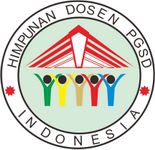Penggunaan Aplikasi Tiktok terhadap Keterampilan Berbicara Mahasiswa
DOI:
https://doi.org/10.31949/jee.v7i1.8538Abstract
TikTok is an application that can post videos that are up to three minutes long. This application is in demand by various age levels. This research was conducted to understand how to use the TikTok application as a learning medium to develop one's speaking skills. In this study, the authors implemented qualitative research methods. The research data came from PGMI STAI Solok Nan Indah students, totaling 36 respondents. The data is obtained by angular spread online. To analyze, this study applies descriptive techniques. Theory triangulation is used in the validation technique in this study. The results of this study are the exposure of the use of the tiktok application to the speaking skills of students at STAI Solok Nan Indah. It is hoped that this innovation can make it easier for teachers or lecturers to improve students' speaking skills and make students as individuals who dare to convey ideas, as well as become generations of coherent, communicative, and easy-to-understand languages.
Keywords:
Tik tok app,, Speaking Skills,, StudentsDownloads
References
Agustin, N. (2021). Dampak Pengunaan Aplıkası Tık Tok Terhadap Karakter Mahasıswa PGMI STAI AL-AZHAR Mengantı Gresık. Jurnal Primary (Kajian Ilmu Pendidikan Dasar Dan Humaniora), 2(1), 45–52. http://ejournal.stkippgri-sidoarjo.ac.id/index.php/psd/article/view/346/248
Alexandro, R., Hariatama, F. ., & Uda, T. (2022). (2022). . Analysis as a Learning MeTikTokdia and Activism Instrument. Jurnal Pendidikan Dan Pengajaran, 55, 5(1)211-221. https://doi.org/http://dx.doi.org/10.23887/jpp.v55i1.44862
Devi, A. A. (2021). Pemanfaatan Aplikasi Tik Tok Sebagai Media Pembelajaran. Jurnal Teknologi Pendidikan, 1(1), 1–5.
Endang Kusripinah, R. R., Yuwana, S., & Hendratno. (2023). Keefektifan Pengembangan Media Buku AJIB Untuk Meningkatkan Keterampilan Berbicara Siswa SD. Jurnal Elementaria Edukasia, 6(2), 837–843. https://doi.org/10.31949/jee.v6i2.5451
Fadhila, N., Hakim, A., Rubianto, S. O., & Afandi, N. A. (2023). Analysis of use the TikTok application as a self-defense mechanism of denial. Proceedings of The 1st International Conference on Indigenous Psychology & Culture (ICIPC), 1(1), 12–20.
Falgoust, G., Winterlind, E., Moon, P., Parker, A., Zinzow, H., & Chalil Madathil, K. (2022). Applying the uses and gratifications theory to identify motivational factors behind young adult’s participation in viral social media challenges on TikTok. Human Factors in Healthcare, 2(May), 100014. https://doi.org/10.1016/j.hfh.2022.100014
Hikmah, M., & Haryadi, H. (2022). Aplikasi Tiktok Sebagai Alternatif Media Pembelajaran Bahasa Indonesia Keterampilan Berbicara Untuk Siswa SMA. Literasi: Jurnal Bahasa Dan Sastra Indonesia Serta Pembelajarannya, 6(2), 369–377. https://doi.org/http://dx.doi.org/10.25157/literasi.v6i2.7801
Immidisetti, A. V., Rosenberg, A. E., Katz, J., Shlifer, A., Ellis, J., Ortiz, R. A., Boockvar, J. A., D’Amico, R. S., & Langer, D. J. (2022). BRAINterns 2.0: Durability of Webinar-Based Education and Social Media Beyond the Coronavirus Disease 2019 Pandemic. World Neurosurgery, 167, e79–e99. https://doi.org/10.1016/j.wneu.2022.07.146
Joiner, R., Mizen, E., Pinnell, B., Siddique, L., Bradley, A., & Trevalyen, S. (2023). Computers in Human Behavior The effect of different types of TikTok dance challenge videos on young women ’ s body satisfaction. Computers in Human Behavior, 147(June), 107856. https://doi.org/10.1016/j.chb.2023.107856
Khumairoh, A. C., & Hasanudin, C. (2023). Pemanfaatan Aplikasi TikTok Sebagai Media Peningkatan Keterampilan Berbicara Pada Siswa di Sekolah Menengah Atas. In Seminar Nasional Daring Sinergi. Prosiding, 1(1), 1287–1296. https://prosiding.ikippgribojonegoro.ac.id/index.php/SND/article/view/1823/pdf
Lahooti, A., Critelli, B., Hassan, A., Westerveld, D., Rodgers, L., Gazi, M., Dawod, E., Mahadev, S., Kumar, S., Newberry, C., & Sharaiha, R. Z. (2023). “The Reynolds–McElhenney effect?”: effect of celebrity endorsement on colonoscopy-related videos on TikTok. IGIE, 2(1), 82–85. https://doi.org/10.1016/j.igie.2023.01.005
Malimbe, A., Waani, F., & Suwu, E. A. A. (2021). Dampak Penggunaan Aplikasi Online Tiktok (Douyin) Terhadap Minat Belajar di Kalangan Mahasiswa Sosiologi Fakultas Ilmu Sosial Dan Politik Universitas Sam Ratulangi Manado. Jurnal Ilmiah Society, 1(1). https://ejournal.unsrat.ac.id/v3/index.php/jurnalilmiahsociety/article/view/35815
Nastia, N., Hastuti, H., Maulana, H. F., Susanto, R. I., Aldin, A., & Rasyid, L. O. M. (2023). Keterampilan Public Speaking dalam Konten Edukatif Melalui Media Tiktok pada Remaja Karantaruna Desa Wajah Jaya. Abdimas Singkerru, 2(2), 130–141. https://doi.org/10.59563/singkerru.v2i2.179
Noviani, M., & Kholiq Hasan, M. A. (2023). Problematika dan Solusi Pembelajaran Keterampilan Berbicara pada Mahasiswa Program Studi Pendidikan Bahasa Arab di UIN Raden Mas Said Surakarta. https://doi.org/10.37274/rais.v7i1.662
Nurviantika, D. M., & Umam, N. K. (2023). The Effect of Tiktok on the Use of Standard Language in Grade 4 Elementary School Children. Edunesia: Jurnal Ilmiah Pendidikan, 4(2), 533–542. https://doi.org/10.51276/edu.v4i2.397
Oktafiani, N., & Haryanto, M. (2022). Persepsi Mahasiswa PBSI-UNIKAL terhadap Aplikasi Tiktok untuk Media Pembelajaran Bahasa dan Sastra Abad 21. Journal on Teacher Education, 4(1), 126–141. https://doi.org/https://doi.org/10.31004/jote.v4i1.5695
Pratama, S., & Muchlis, M. (2020). Pengaruh aplikasi tik tok terhadap ekspresi komunikasi mahasiswa universitas islam negeri (uin) sunan ampel surabaya tahun 2020. INCARE, International Journal of Educational Resources, 1(2), 102–115. http://ejournal.ijshs.org/index.php/incare/article/view/64
Putri, S. N. (2022). Tiktok (Alternatif Media Pembelajaran Bahasa Di Kalangan Mahasiswa). In Prosiding Seminar Nasional Inovasi Pendidikan, 203–208. https://e-proceedings.iain-palangkaraya.ac.id/index.php/PSNIP/article/view/758.
Shoukat, M. H., Selem, K. M., Elgammal, I., Ramkissoon, H., & Amponsah, M. (2023). Consequences of local culinary memorable experience: Evidence from TikTok influencers. Acta Psychologica, 238(June), 103962. https://doi.org/10.1016/j.actpsy.2023.103962
Sukartiningsih, W. (2021). Pengaruh Pemanfaatan Medıa Sosıal Tık Tok Terhadap Keterampılan Berbıcara Sıswa Kelas IV SDN Trosobo II. JPGSD, 09(09). https://ejournal.unesa.ac.id/index.php/jurnal-penelitian-pgsd/article/view/42710
Tri Cahyo Sarjana Putra, R. (2023). Model Project Based Learnıng Dengan Medıa Dıorama Mengoptımalkan Keterampılan Berbıcara Dan Menulıs Karangan Narası Sıswa Kelas V 1 Universitas Muhammadiyah Surakarta , Surakarta , Indonesia 2 Universitas Muhammadiyah Surakarta , Surakarta , Indonesia * C. Edukasia, Jurnal Elementaria, 6(4), 1635–1646. https://doi.org/10.31949/jee.v6i4.7159
van der Bend, D. L. M., Gijsman, N., Bucher, T., Shrewsbury, V. A., van Trijp, H., & van Kleef, E. (2023). Can I @handle it? The effects of sponsorship disclosure in TikTok influencer marketing videos with different product integration levels on adolescents’ persuasion knowledge and brand outcomes. Computers in Human Behavior, 144(March), 107723. https://doi.org/10.1016/j.chb.2023.107723
Zhou, Q., Sotiriadis, M., & Shen, S. (2023). Using TikTok in tourism destination choice: A young Chinese tourists’ perspective. Tourism Management Perspectives, 46(March), 101101. https://doi.org/10.1016/j.tmp.2023.101101












